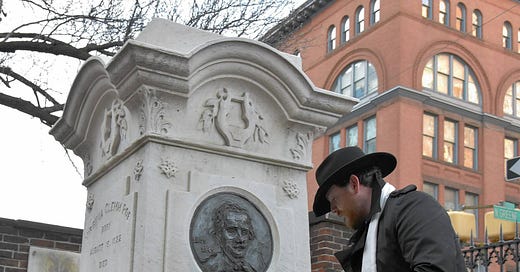The Legend of the Poe Toaster
Honoring one of America's most renowned writers of mystery, weird, and science fiction
On 19 January, 2023, a tradition honoring poet and writer Edgar Allan Poe returned to Baltimore, Maryland., accompanied by much acclaim.
In the early hours of Edgar Alan Poe’s birthday, a shadowy figure approached the marker of Poe’s first grave. There, in front of the first resting place of one of America’s greatest writers, the man poured a glass of cognac and raised it in a Latin toast. This unknown individual then departed, leaving behind three roses on the gravestone, along with the open cognac bottle. Known only as the Poe Toaster, records indicate that this tradition has been a yearly occurrence since the 1930s.
For no less than three men are known to have donned the white scar in the early morning to pay respects to Poe. And, when the tradition lapsed in 2010, many more imposters sprung up to fill the gap in what had become a beloved Baltimore tradition. Until, in 2015, the Maryland Historical Society gathered to revive the tradition proper. Like the presumed father and son before him, this new Poe Toaster remain unknown, only to appear on Poe’s birthday for the early morning toast.
A eerie mystery befitting the father of the detective mystery. But what of the writer who would be honored in this fashion?
Poe wrote in the 1830s and 40s up until his death in Baltimore in 1849. He wrote in a time when papers and magazine were booming even when the country was going bust. Many of these magazines were fly-by-night, lasting for only a few issues, a situation the pulps echoed in the Great Depression. Like the later million-words-a-year pulp masters, Poe earned his living solely through his writing.
But what he wrote is more remarkable. While Poe is typically known as a poet for his eminently popular “The Raven”, he may be more important to world literature and fiction for his prose. Poe helped popularize the short story, turning it into a form that later Americans would master. Poe invented the detective mystery with "The Murders in the Rue Morgue,” creating a formula used by dime novelists, pulp writers, noir scriptwriters, and today’s detective stories. He adapted English Gothic conventions to American audiences, writing tales of the macabre that inspired the American Gothic tradition that culminated in Weird Tales and H. P. Lovecraft. Finally, it was to Poe that the early American science fiction writers turned to as the originator of the science fiction genre.(1)
Edgar Allan Poe changed the way the world wrote and read fiction. And the aftershocks continue in all storytelling media to this day. Without him, we would not have the stories of the bizarre and the mysterious that inspire The Bizarchives.
And without Poe, there would be no Poe Toaster.
No Weird Tales, Black Mask, or Argosy.
No Sherlock Holmes, no John Carter, no Jules de Grandin.
And the world would be poorer for it.
(1) Yes, I know many today claim Mary Shelley’s Frankenstein as the originator of modern science fiction. Isaac Asimov and his contemporaries disagreed, complaining of a tendency of science fiction fans to latch onto anything that loosely resembled science fiction in a search for respectability. For what its worth, I credit Johannes Kepler’s 1608 Sommium as the first modern science fiction story, one that gave birth to a Germanic tradition often ignored by myopic English-language science fiction fans. But that is a story and an argument for another time.




